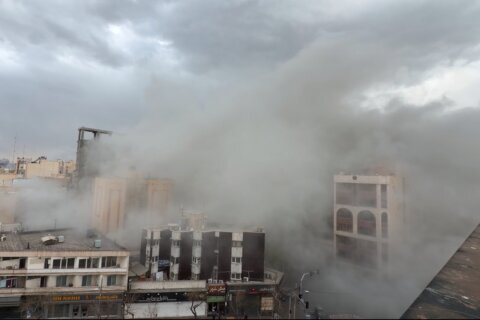WASHINGTON — Concern is growing that the al Qaida-linked Khorasan
group is continuing to plot against the U.S. in the ungoverned spaces of war-
torn Syria.
On Nov. 18, “in Northwestern Syria, near Haram, a U.S. airstrike destroyed a
storage facility associated with the Khorasan group. We believe they were
storing weapons and explosives at this particular site,” says Pentagon
Spokesman Col. Steve Warren.
Intelligence sources say the organization, made up of a “relatively small
number of operatives,” was dealt a significant setback by U.S. military
airstrikes in late September, but only “mid-level operatives were eliminated.”
Lt. Gen. William Mayville, director of operations for the Joint Chiefs of
Staff, told reporters at the Pentagon at the time, “We’ve been watching this
group closely for some time and we believe the Khorasan group was nearing the
execution phase of an attack either in Europe or the homeland.”
Mayville said the Pentagon believed the Khorasan group had attempted to
recruit Westerners to serve as operatives or to filter back into their
homelands.
While they were reluctant this week to discuss what kind of battle damage has
been done
to the organization, it’s widely believed in U.S. intelligence and military
circles that the leadership of the group is intact and continues
plotting against the West, specifically the U.S.
A subset of the al Qaida-operated Nusrah front in Syria, Khorasan has been
mentioned in press reports as having between seven and 80 members. But a U.S.
official tells WTOP the number is “closer to the lower end of the spectrum.”
International sources tell WTOP the size of the group is best described as
dozens. The members, according to a U.S. source familiar with the
organization, are “hardcore, younger members of al Qaida who have traveled to
many places and done bad things.”
A leading cause for the initial concern about the group was the belief that it
was planning to use bombs made of non-metallic materials. Among them was
clothing soaked in explosive material, then dried; and toothpaste as well.
The primary concern regarding Khorasan for U.S. and international officials is
that the intense focus on ISIL in Iraq and Syria will create space and time
for Khorasan to regain momentum in their western plotting.
But Warren said, “We’re going to continue to keep pressure on them. We will
continue to strike them when we see them. We’ll continue to strike them when
we have to opportunity. We will continue to degrade them until they are no
longer a threat to America.”
Follow @WTOP on Twitter and WTOP on Facebook.







